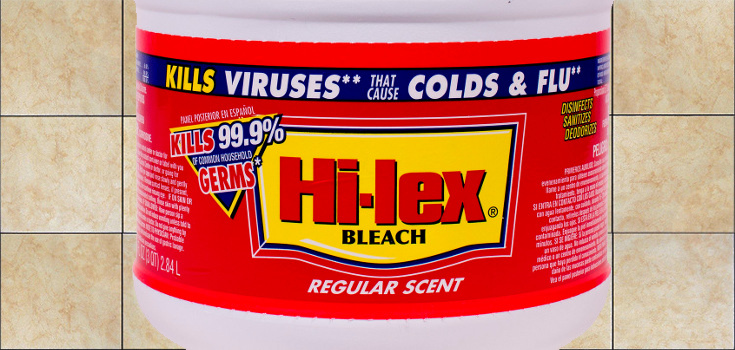New Study: How Using Bleach Could be Making Us Sick

A study published earlier this month suggests that a variety of illnesses may be fostered by the use of bleach, an old-time cleaner. How could that be? Bleach is used to kill bacteria, just as antibacterial soap and hand sanitizers are. Each of these products is hazardous to your relationship with the beneficial bacteria in your gut, and it is these bacteria that make up the backbone of the immune system. How ironic that the compounds we have been using to stay clean and avoid germs could be making us sick
Researchers from Spain, Finland, and the Netherlands investigated the correlation between bleach use in the home and frequency of infection in 9102 children ages 6-12. Parents filled out a questionnaire revealing whether they used bleach in the weekly cleaning of their home. They also reported the frequency of infections in their children, such as influenza, tonsillitis, ear infections, sinus and pneumonia during the past year.
Although the frequency of bleach use varied greatly in the countries from which the participants were drawn, the researchers were able to determine that overall, the prevalence of single and recurrent infections was higher among children whose parents used bleach.
They concluded that using bleach to clean the home may increase the risk of respiratory and other infections in school-age children, and this may indicate a public health issue.
The study abstract concludes:
“Passive exposure to cleaning bleach in the home may have adverse effects on school-age children’s health by increasing the risk of respiratory and other infections. The high frequency of use of disinfecting irritant cleaning products may be of public health concern, also when exposure occurs during childhood.”
This report is not the first to show the use of antibacterial products compromises immunity – it’s called the hygiene hypothesis. Tufts University microbiologist Dr. Stuart Levy, speaking at the International Conference on Emerging Infectious Diseases, has found that using antibacterial soaps on children may contribute to the development of chronic disease. He noted that antibacterial products could promote the growth of drug-resistant “superbugs” that could have been kept in check with little more than a scrubbing with soap and water.
As far as he is concerned, the effort to keep bodies and the things they touch free of bacteria is misguided. “The vast majority of bacteria are out there serving a purpose for us. Helping our intestinal track mature, helping our immune system mature,” he told ABC News in an interview.
Dr. Levy subscribes to the hygiene hypothesis, which states that when young children do not get enough exposure to bacteria, the immune system can overreact to pollen or dust, or other ordinarily harmless substances.
Professor Michael Osterholm of the University of Minnesota told ABC that “the hygiene hypothesis is all about killing the good bugs that we need to stimulate our immune system in our body and provide competition with the bad bugs.”
In 2013, another study team evaluated the effects from household use of cleaning products during pregnancy on infant outcome. They found that using cleaning sprays, air fresheners and solvents can increase risk of wheezing and infections in the offspring.
Another longitudinal study completed in 2007 found that frequent use of common household cleaning sprays may be an important risk factor for adult asthma.
It’s Really a Matter of Degree
How much exposure to such products can a child, or for that matter an adult, handle before disease begins to manifest? Right now we have become so germ phobic that the main compounds used in antibacterial products have become ubiquitous. They are found in refrigerators, cutting boards, plastic lunchboxes, furniture, mattresses, shoes, clothing, and throughout industrial settings. Are we trying to surround ourselves with an antibiotic force field?
The evidence that such behavior will lead to better outcomes is sorely lacking. Even the conservative bastion that is Harvard has come out in their health newsletter saying that regular soap and water is just as effective at cleaning as antibacterial products, and soap and water produces no side effects.
Additional Sources:

Dr Hulda Clark wrote about this in her books on Cancer, saying that bleach releases the eggs of certain sheep parasites or flukes which we have stored in the liver, so that makes us very sick.
Wow, I never knew that before.
As someone who has been exposed to bleach as a household cleaning agent since infancy and still in regular use today (now aged 84) I have had remarkably good health so regard this finding as suspect. My present wife (2nd marriage) has suffered traumatically since birth and the smell of bleach (which was used copiously in children’s homes) has an upsetting effect on her but she insists on using numerous other detergents which smell like public lavatories! Could this research be highlighting a degree of emotional deprivation or other traumatic early childhood event rather than what the results appear to suggest ?